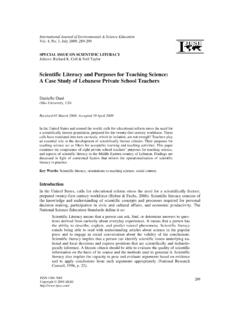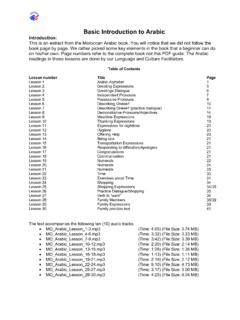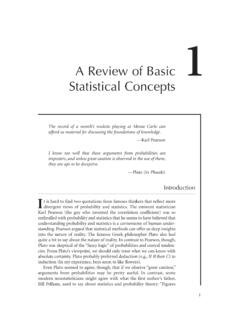Transcription of An Introduction to Lan9uage - Universidade Federal de ...
1 An Introduction to Lan9uage SEVENTH EVITION. Victoria fromkin University of California, Los Angeles (Deceased). Robert Rodman North Carolina State University, Raleigh Nina Hyams University of California, Los Angeles THOM5~ON. *. WADSWORTH. Australia Canada Mexico Singapore Spain United Kingdom United States THOMSON. *. WADSWORTH. An Introduction to Language, Seventh Edition Victoria Fromkin, Robert Rodman, Nina Hyams Publisher: Michael Rosenberg Compositor, Text Designer: Publishers' Design an. Acquisitions Editor: Stephen Dalphin Production Services Developmental Editor: Amanda Robinson Project Manager: Gail Farrar Production Editor: Lianne Ames Copyeditor: Joan Flaherty Director of HED Marketing: Lisa Kimball Cover Illustration: ArtvilleiGetty Executive Marketing Manager: Ken Kasee Cover Designer: Ha Nguyen Marketing Manager: Katrina Byrd Printer: Maple Vail Printers Manufacturing Coordinator: Marcia Locke Copyright 2003 by Wadsworth, a part of Thomson Corporation.
2 Wadsworth, Thomson and the Thomson For permission to use material from this text or logo are trademarks used herein under license. product contact us: Tel 1-800-730-2214. Printed in the United States Fax 1-800-730-2215. 3 4 5 6 7 8 9 10 07 06 05 04 Web For more information contact Wadsworth, 25 Thomson Place, Boston, Massachusetts 02210 USA, or you can visit our Internet site at All rights reserved. No part of this work covered by the copyright hereon may be reproduced or used in Library of Congress any form or by any means - graphic, electronic, or ~ataloging-inPublication Data mechanical, including photocopying, recording, I. taping, Web distribution or information storage and Fromkin, Victoria retrieval systems - without the written permission An Introduction to language / Victoria Fromkin, Robert of the publisher.
3 Rodman, Nina ed. p. em. Includes biographical references and index. ISBN 0-1 5-50848 I-X. I. Language and languages. 2. Linguistics. I. Rodman, Robert. II. Hyams, Nina M. III. Title PI07 .F76 2002. 4lO-dc21. 2002069080. The Nature of Human language Reflecting on Noam Chomsky's ideas on the innateness of the fundamentals of grammar in the human mind, Isaw that any innate features of the language capacity must be aset of biological structures, selected in the course ofthe evolution of the human brain. -So E. Luria, A510t Machine, ABroken Test Tube, An Autobiography The nervous systems of all animals have anumber of basic functions in common, most notably the control of movement and the analysis of sensation. What distinguishes the human brain is the variety of more specialized activities it is capable of learning.
4 The preeminent example is language. -Norman Geschwind, 1979. Linguistics shares with other sciences aconcern to be objective, systematic, (onsistent, and explicit in its account of language. like other sciences, it aims to collect data, test hypotheses, devise models, and construct theories. Its subject matter, however, is unique: at one extreme it overlaps with such 'hard' sciences as physics and anatomy; at the other, it involves such traditional 'arts' subjects as philosophy and literary criticism. The field of linguistics includes both science and the humanities, and offers abreadth of coverage that, for many aspiring students of the subject, is the primary source of its appeal.. -David Crystal, 1987. When we study human language, we are approaching what some might call the "human essence," the distinctive qualities of mind that are, so far as we know, unique to man.)
5 Noam Chomsky, Language and Mind A 1hatever else people do when they come together - l ~ whether they play, fight, make I \/ love, or make automobiles - they talk. We live in a world of language. We talk to our friends, our associates, our wives and husbands, our lovers, our teachers, our par- ents, our rivals, and even our enemies. We talk to bus drivers and total strangers. We talk face-to-face and over the telephone, and everyone responds with more talk. Television and radio further swell this torrent of words. Hardly a moment of our waking lives is free from words, and even in our dreams we talk and are talked to. We also talk when there is no one to answer. Some of us talk aloud in our sleep. We talk to our pets and some- times to ourselves. The possession of language, perhaps more than any other attribute, distinguishes humans from other animals.
6 To understand our humanity, one must understand the na- ture of language that makes. us human. According to the philosophy expressed in the myths and religions of many peoples, language is the source of human life and power. To some people of Africa, a newborn child is a kintu, a "thing," not yet a muntu, a "per- son." Only by the act of learning language does the child become a human being. Ac- cording to this tradition, then, we all become "human" because we all know at least one language. But what does it mean to "know" a language? 3. ~uistic Knowlea9,--e _. When you know a language, you can speak and be understood by others who know th2. language. This means you have the capacity to produce sounds that signify certaiJ. meanings and to understand or interpret the sounds produced by others. We are referrin: to normal-hearing individuals.
7 Deaf persons produce and understand sign language just as hearing persons produce and understand spoken languages. The languages of tho deaf communities throughout the world are, except for their modality of expression equivalent to spoken languages. Most everyone knows a language. Five-year-old children are nearly as proficient a speaking and understanding as their parents. Yet the ability to carry out the simplest con versation requires profound knowledge that most speakers are unaware of. This is true fo speakers of all languages, from Albanian to Zulu. A speaker of English can produce: sentence having two relative clauses without knowing what a relative clause is, such as My goddaughter who was born in Sweden and who now lives in Iowa is named Disa, after a Viking queen. In a parallel fashion, a child can walk without understanding or being able to ex plain the principles of balance and support, or the neurophysiological control mecha nisms that permit one to do so.
8 The fact that we may know something unconsciously i: not unique to language. What, then, do speakers of English or Quechua or French or Mohawk or arabic know'. Knowledge ofthe sound System Part of knowing a language means knowing what sounds (or signs 1) are in that language and what sounds are not. This unconscious knowledge is revealed by the way speaken By Johnny Hart Ye;5, H~G IN ." CAN r TELl- HIM WHoG CALLING? .. t.:::.:===-__:..;_--" -' .I I a/,'. " " copyright Creators Syndicate, Inc. Reprinted by permission of Johnny Hart and Creators Syndicate, Inc. I The sign languages of the deaf will be discussed throughout the book. As stated, they are essentially the same as spoken languages, except that they use gestures instead of sound. A reference to "language" then, unless speech soundsor spoken languages are specifically mentioned, includes both spoken and signed languages.
9 CH ER. What Is Language? When we study human language, we are approaching what some might call the "human essence," the distinctive qualities of mind that are, so far as we know, unique to man. Noam Chomsky, Language and Mind .. W hatever else people do when they come together - whether they play, fight, make love, or make automobiles - they talk. We live in a world of language. We talk to our friends, our associates, our wives and husbands, our lovers, our teachers, our par- ents, our rivals, and even our enemies. We talk to bus drivers and total strangers. We talk face-to-face and over the telephone, and everyone responds with more talk. Television and radio further swell this torrent of words. Hardly a moment of our waking lives is free from words, and even in our dreams we talk and are talked to. We also talk when there is no one to answer.
10 Some of us talk aloud in our sleep. We talk to our pets and some- times to ourselves. The possession of language, perhaps more than any other attribute, distinguishes humans from other animals. To understand our humanity, one must understand the na- ture of language that makes. us human. According to the philosophy expressed in the myths and religions of many peoples, language is the source of human life and power. To some people of Africa, a newborn child is a kintu, a "thing," not yet a muntu, a "per- son." Only by the act of learning language does the child become a human being. Ac- cording to this tradition, then, we all become "human" because we all know at least one language. But what does it mean to "know" a language? 3. The Nature of Human Lan9uage Reflecting on Noam Chomsky's ideas on the innateness of the fundamentals of grammar in the human mind, Isaw that any innate features of the language capacity must be aset of biological structures, selected in the course ofthe evolution of the human brain.







